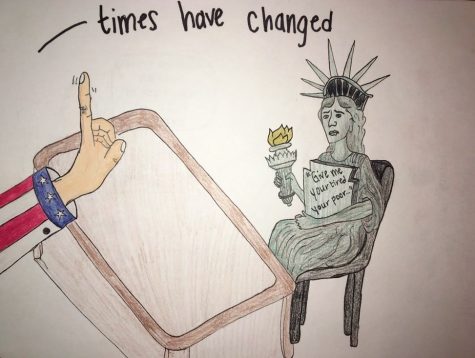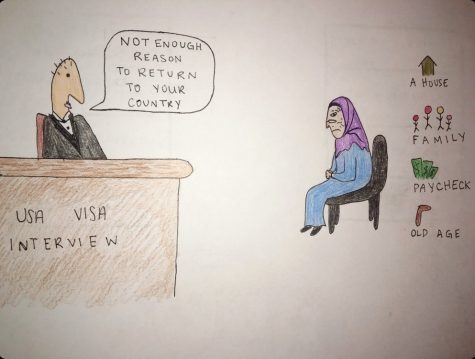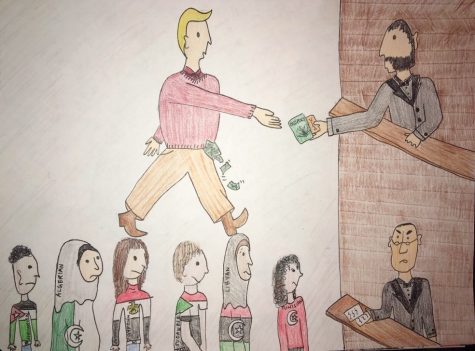South Lakes sophomore shares her family’s visa experience through political cartoons
Amany Bouali is a sophomore at South Lakes who has drawn emotional political cartoons that illustrate her views on the process of visa laws in the United States. Bouali came about this during the sophomore International Baccalaureate Middle Years Program (MYP) project. She made cartoons “based on real events” that happened to her family, who come from Tunisia. Bouali explained that she was inspired because “the amount of islamophobia in people is growing due to terrorist attacks and stereotypes about all Muslims and Arabs about how they are automatically bad people with bad morals, and how this adds to Arabs being unwanted in the USA and being denied Visas.” Bouali has shared her comics with the Sentinel, and her descriptions of these designs.
“Times Have Changed”

The political cartoon titled “Times Have Changed” shows the Statue of Liberty holding the traditional torch and a book that reads “give me your tired, your poor…” The statue is sitting at a desk and from the other side of the desk only a hand is seen and it is shaking a finger back and forth saying that “times have changed.” With a sad expression, the statue of liberty sits helplessly in the chair, observing the selfish ways that have grown to become the normalities in America. The politicians who are running this country have forgotten that 400 short years ago they too were immigrants coming from Europe. They stole this land from the natives and left Europe in search of independence, yet they won’t allow others from different regions in the world to live this dream of liberty and freedom on the same land.
“Never Enough Reason”
 The cartoon labeled “Never Enough Reason” depicts an old woman sitting on a chair placed distantly from the visa interviewer seated at the desk. The distance is meant to represent the level of understanding for the woman the interviewer will never have. The only thing he is able to see is her hijab, and the country she is from. Although this woman is of old age, has a sustainable paycheck, has almost all her family in the country she is from and has her own house, the interviewer still claims there isn’t enough of a reason to return toher country. This woman is 72 years old, although this woman is a widow she has a stable monthly salary that she receives, all of her children, grandchildren, and siblings live in Tunisia, and she has a house near the Mediterranean Sea that she cherishes every day of her life. This woman just wants to come to the United States to see her oldest daughter and her kids. She wants to see America, see where her daughter lives, see where her grandchildren go to school. But she can’t, because once she is here there won’t be enough of a reason for her to return to her country. This woman is my grandma.
The cartoon labeled “Never Enough Reason” depicts an old woman sitting on a chair placed distantly from the visa interviewer seated at the desk. The distance is meant to represent the level of understanding for the woman the interviewer will never have. The only thing he is able to see is her hijab, and the country she is from. Although this woman is of old age, has a sustainable paycheck, has almost all her family in the country she is from and has her own house, the interviewer still claims there isn’t enough of a reason to return toher country. This woman is 72 years old, although this woman is a widow she has a stable monthly salary that she receives, all of her children, grandchildren, and siblings live in Tunisia, and she has a house near the Mediterranean Sea that she cherishes every day of her life. This woman just wants to come to the United States to see her oldest daughter and her kids. She wants to see America, see where her daughter lives, see where her grandchildren go to school. But she can’t, because once she is here there won’t be enough of a reason for her to return to her country. This woman is my grandma.
“Because of Who You Are”

The cartoon “Because of Who You Are” shows immigration and visa booths to the right of the page. Along the bottom, there is a line of Arab people who would like to come to the United States with a visitor visa. The man looking over their paperwork is drawn with an angry expression and it is obvious he is going to give every person in the line a hard time. Everyone in line, male or female, hijab or no hijab, is Arab and is waiting to receive their visa with blank and discontented faces. In the upper booth, a man is seen with a passport and visa in hand and a clear expression. There is a white man dressed in casual attire with money spewing out of his pockets walking on the Arab’s heads. This symbolizes the degradation and favoritism built into the immigration system. Many factors contribute to the reasoning behind the unfair decision to deny someone a visa that is unfortunately made every day. Every country’s passport has a mobility score which defines how mobile a citizen of that country can be around the world. The mobility score determines what countries the holder of the passport is going to need a visa to enter or if they may travel there freely. The higher the score the more places a citizen can travel. For example, the Spanish, French, and German passports all have mobility scores of 173 whereas Libya, Tunisia, Morocco, and Egypt have scores between 49 and 77. These scores are determined by a number of aspects but heavily influenced by the economy of the country. At the end of the day, the visa system is a business and they only want to award visas to people who have the money to fuel and give back to the American economy. So one can collect that the ideas of racism and prejudice are actually further encouraged by the visa system.
Helen is News Editor, Editor-In-Chief, founder and manager of the broadcasting department. She is the head manager of the Sentinel's social media. She...
















